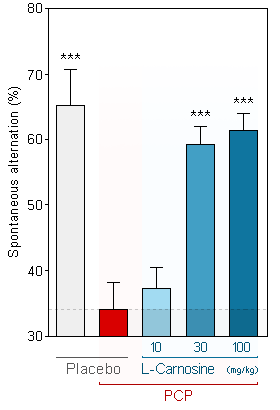A potential game-changer for cognitive health?
Newsletter # 121

In vivo studies
L-Carnosine, originally discovered in meat and naturally occurring dipeptide composed of beta-alanine and L-histidine, has long been recognized for its antioxidant, anti-aging, and neuroprotective properties. Clinical trials have explored its potential in various health conditions, including multiple sclerosis and diabetic nephropathy. Research suggests that L-Carnosine supplementation may enhance brain function, reduce oxidative stress, and improve metabolic health. Notably, randomized, double-blind, placebo-controlled trials have demonstrated improvements in cognitive performance, metabolic health, and even skin vitality, underscoring its versatility as a therapeutic compound.
A recent preclinical study from Neurofit has provided intriguing new insights into L-Carnosine's potential impact on cognitive health. The study showed that L-Carnosine was able to induce a dose-dependent reversion of PCP-induced cognitive deficits in mice, suggesting that it may hold promise for conditions involving cognitive decline and neurodegenerative diseases.
Phencyclidine (PCP) is known to impair cognition, mirroring symptoms seen in certain psychiatric and neurodegenerative conditions. While these early findings are promising, further research is needed to confirm L-Carnosine’s potential as a natural cognitive enhancer. The data points to its ability to reduce oxidative stress, modulate neurotransmission, and support neural function, but much more exploration is required to fully understand its therapeutic value.
Phencyclidine (PCP) is known to impair cognition, mirroring symptoms seen in certain psychiatric and neurodegenerative conditions. While these early findings are promising, further research is needed to confirm L-Carnosine’s potential as a natural cognitive enhancer. The data points to its ability to reduce oxidative stress, modulate neurotransmission, and support neural function, but much more exploration is required to fully understand its therapeutic value.
As research continues, L-Carnosine could emerge as a key player in developing new strategies for cognitive health. While this is just the beginning, its potential to contribute to future treatments for cognitive disorders is an exciting area of scientific inquiry. Stay tuned as we continue to follow this evolving story.
-
Improvement of PCP-induced cognitive deficit by L-Carnosine
-
 *** indicates p ≤ 0.001, as compared to red column
*** indicates p ≤ 0.001, as compared to red column
-
The graphs illustrate mice’s cognitive performance measured through spontaneous alternation in the T-maze, a widely used test for assessing rodent cognition in a single session. Higher spontaneous alternation rates indicate better cognitive performance. A significant reduction below the chance level (50%) suggests repetitive behavior (stereotypy)—a sign of cognitive deficit commonly observed in dementia and schizophrenia.
PCP (Phencyclidine), an NMDA receptor antagonist, induces symptoms resembling schizophrenia and cognitive impairment. This is reflected in a decrease in spontaneous alternations in PCP-treated mice (white vs. red column), indicating stereotypy and cognitive deficits.
L-Carnosine administration shows a dose-dependent improvement in spontaneous alternation performance in PCP-treated mice (red vs. blue columns), suggesting a potential cognitive-enhancing effect.

 PREVIOUS
PREVIOUS
